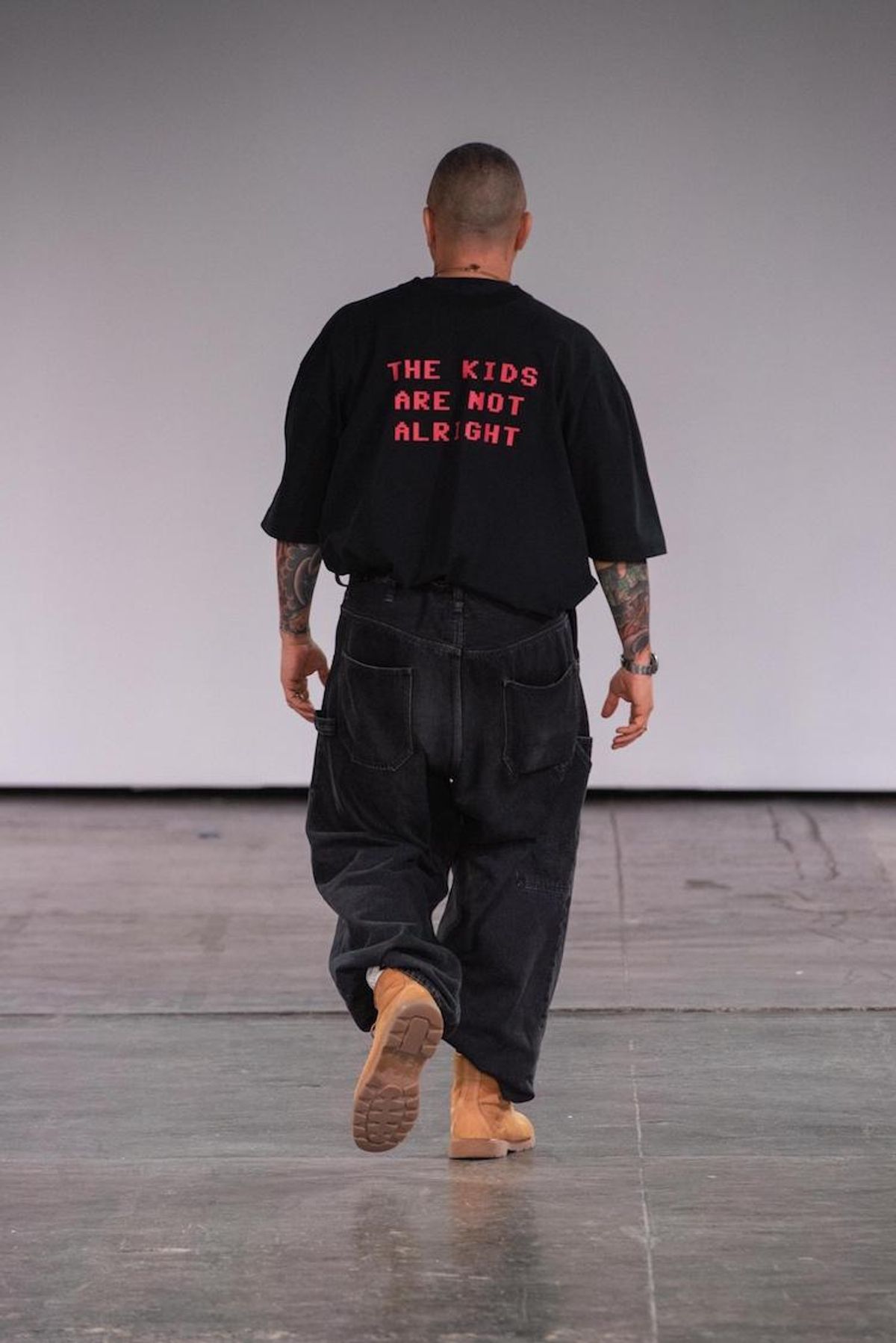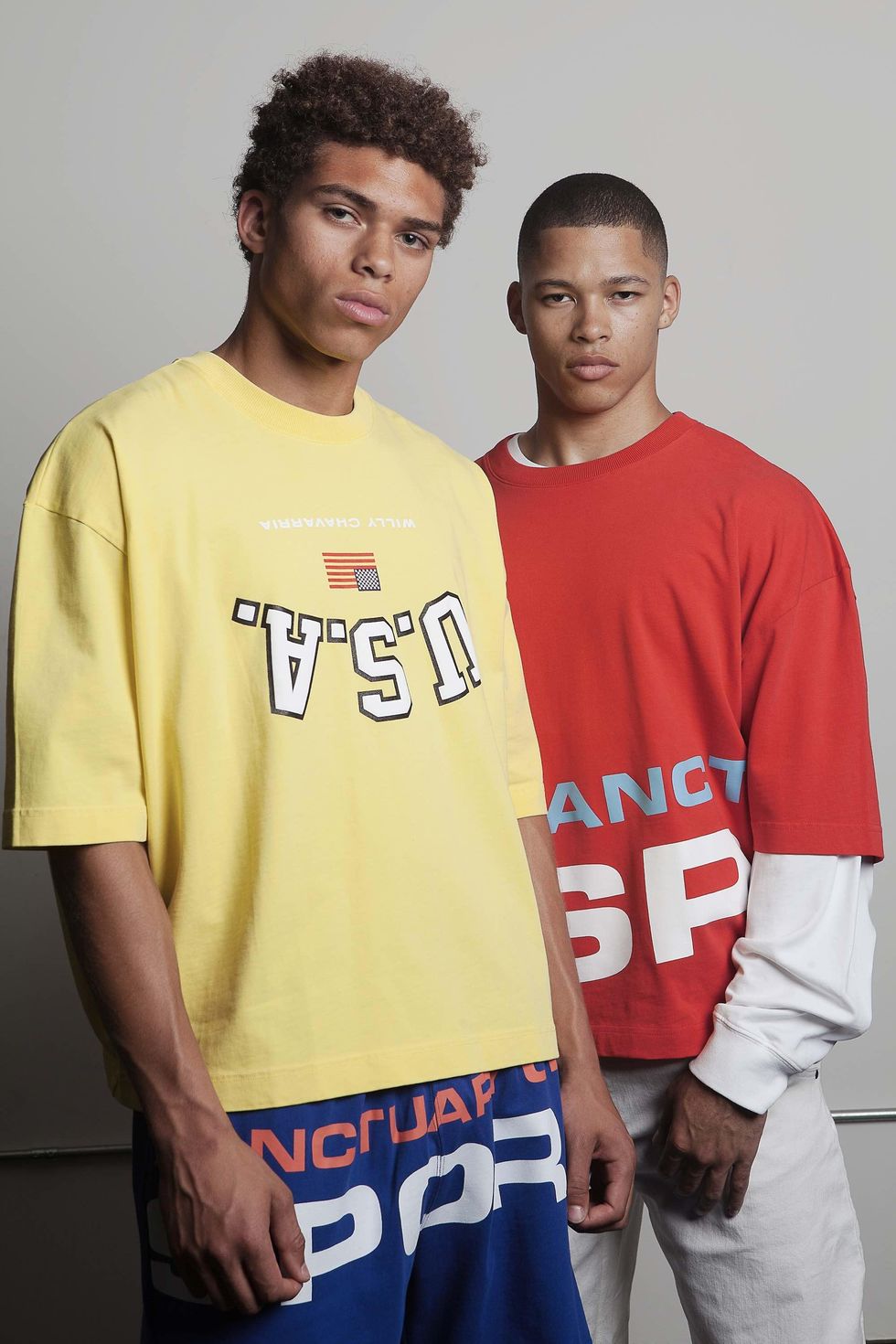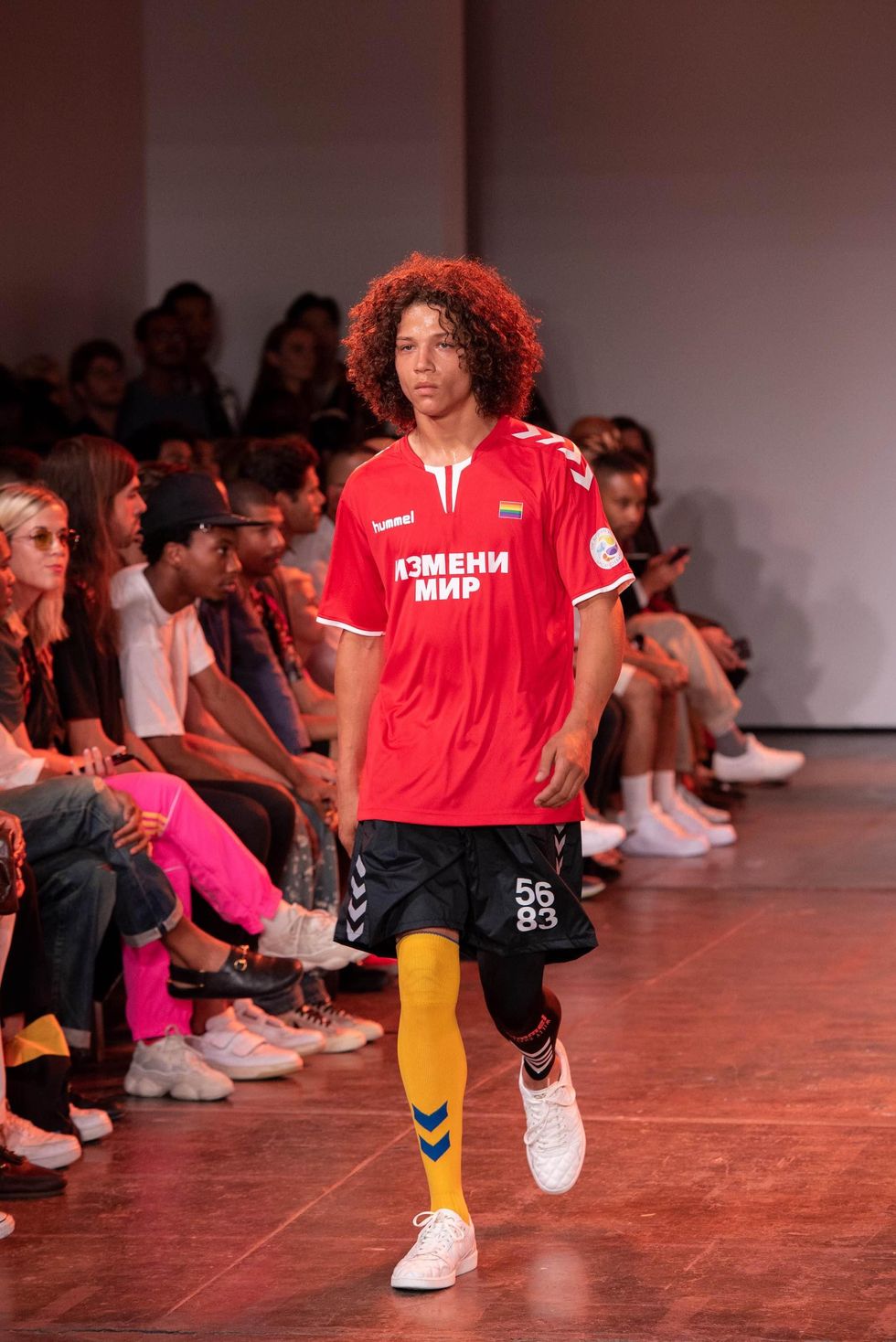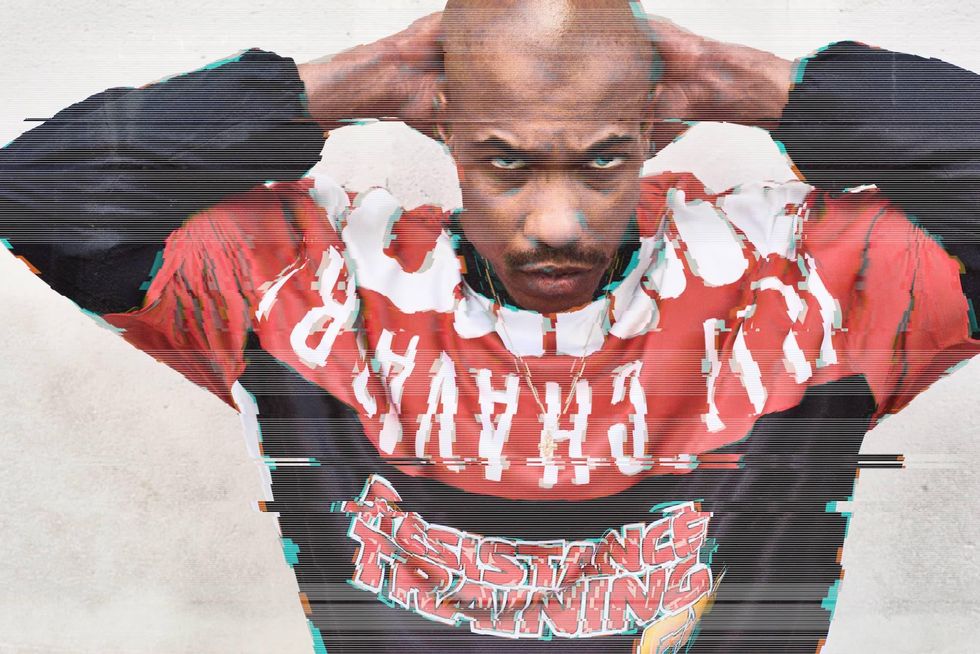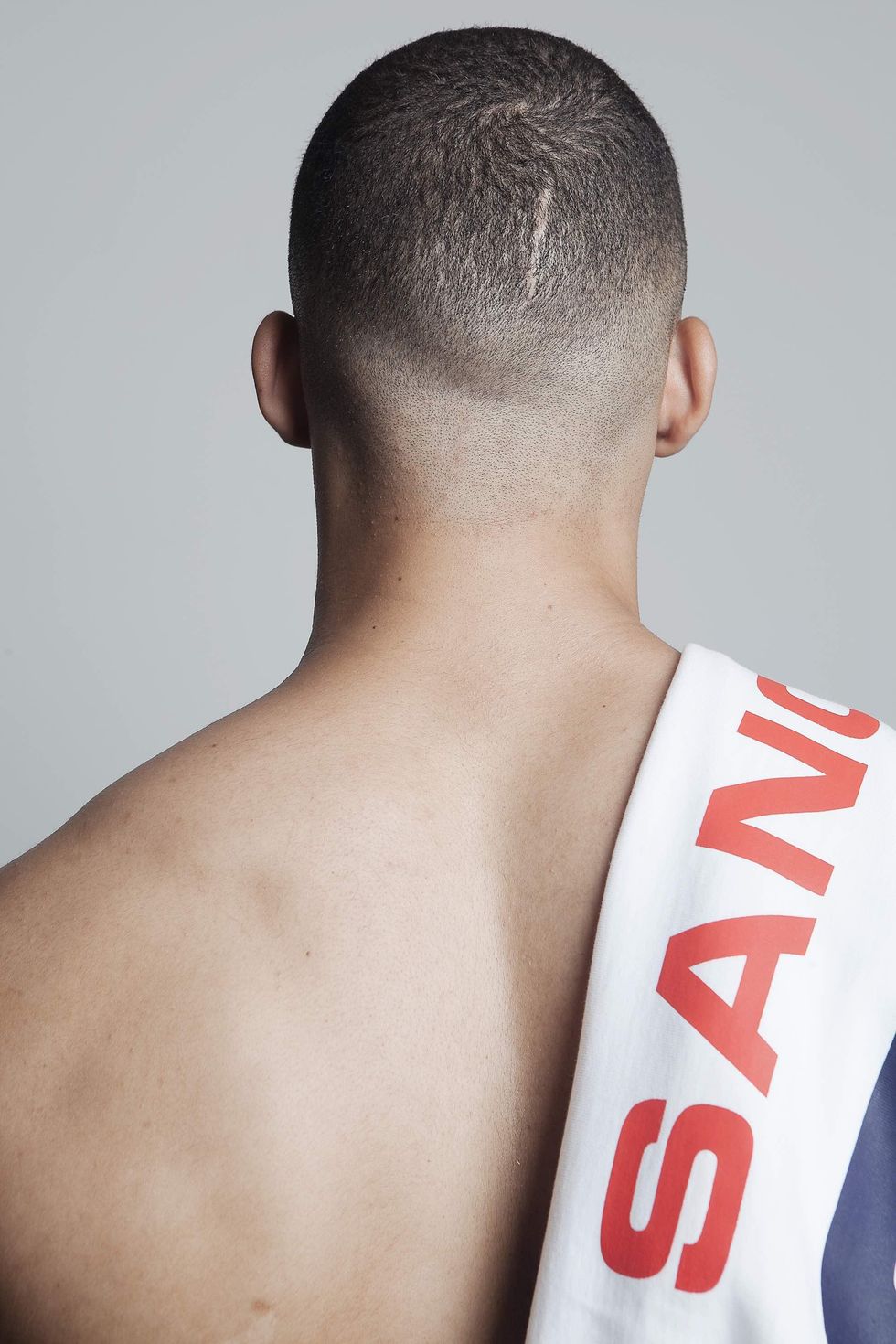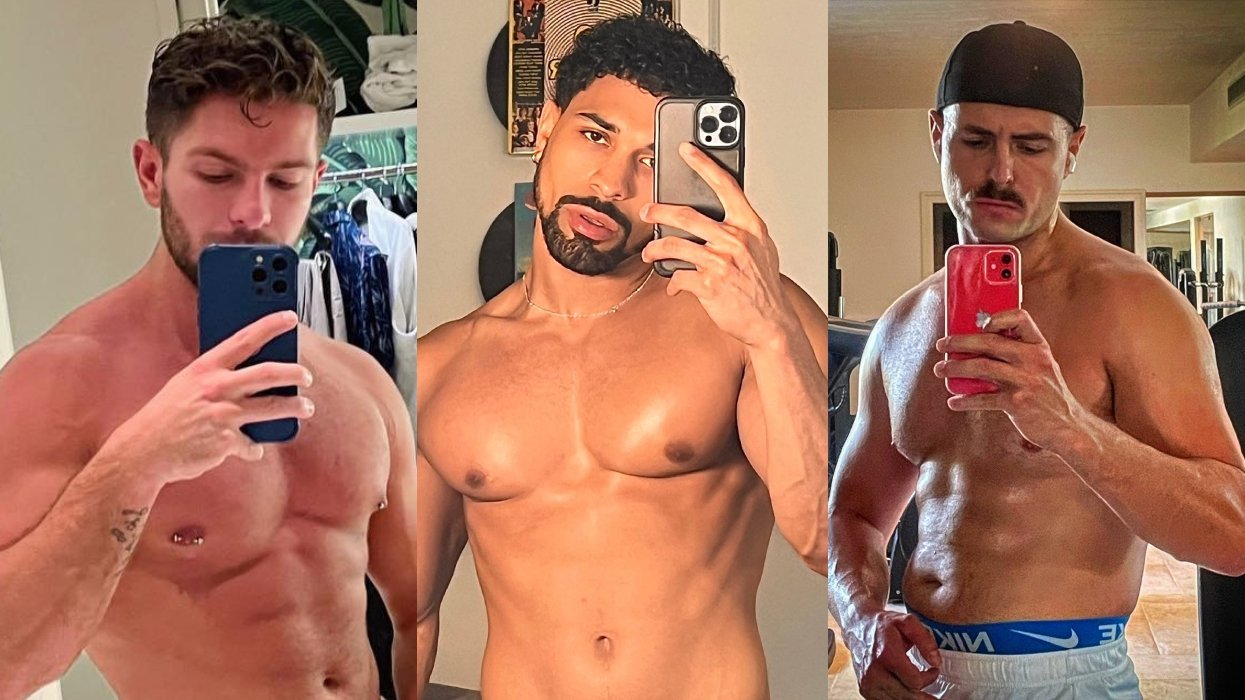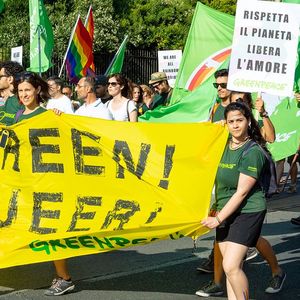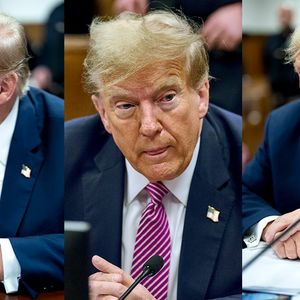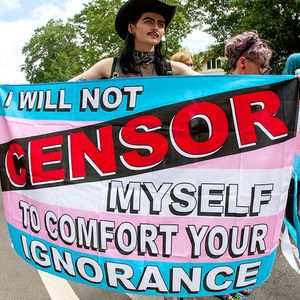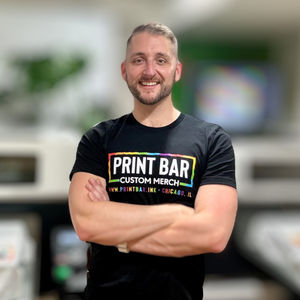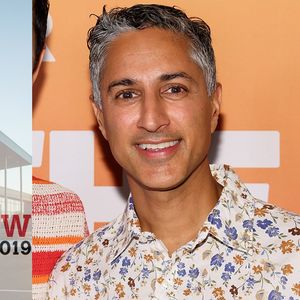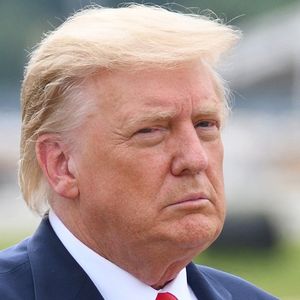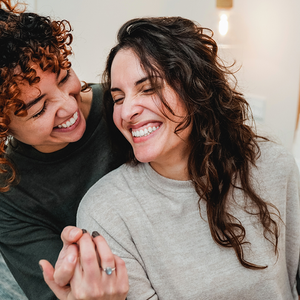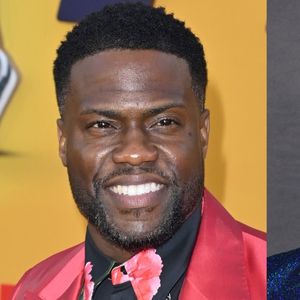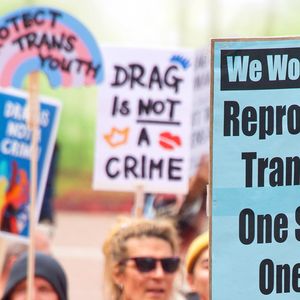Trying to keep up with the news cycle in our political climate is a bit like getting whiplash in a burning room. We're constantly pivoting from one tragic decision by the president to another, which is why, for some, the immigration crisis may already be on the backburner as Russiagate rips through our collective consciousness once again.
For Willy Chavarria though, immigration, refugees, and asylum seekers are more than just a blip in the news cycle. It took only one look at his searing Summer '19 runway show at New York Fashion Week this past week to know that. Before a single model stepped onto the runway, a voice echoed through the space, asking: "Have you ever seen a human in a cage?" It wasn't the first time the morality of America's treatment of immigrants and communities of color have weaved their way into the fabric of Chavarria's shows, either. In a darkened chamber of Chelsea Piers last season, he presented an unflinchingly raw collection that featured blood-red walls and models with tears streaming down their faces and makeup that brought an exhausted and overworked shadow to their eyes.
Related | Willy Chavarria Brought Somber, Tearful Realness to the Runway
It's with his latest collection that the queer, Chicano designer has brought an urgency and action to his clothing and shaken up the fashion industry in one fell swoop. Rather than stage a runway show and call it a day, the California-born designer collaborated with Danish sports brand Hummel for a dual approach to the Spring/Summer '19 collection. Alongside the higher-end garments that punctuate his brand, Chavarria and Hummel will release a line of soccer clothes that tap into the unifying culture of the sport.
As France's World Cup-winning team showed (with no less than 15 players with African roots), soccer is not bound by borders. Hummel and Chavarria weren't content to solely offer an affordable line of clothes, though. Together, they teamed with Rooklyn, a soccer league for immigrants, refugees, and asylum seekers to outfit them in the new collection. It's all par for the course for the designer whose brand history has been interwoven with politics since it began in 2005.
While he celebrated the end of another hectic fashion week and prepared to head back to his home in Copenhagen, we caught up with Chavarria to talk about the anxiety of having his husband see his runway show for the first time, New York Fashion Week's political edge, and why he doesn't consider himself an activist.

Photography by Brent Chua.
OUT: For this collection, you're doing a higher and lower-priced segment. Walk me through the decision to do that.
Willy Chavarria: The concept of the collection began with a story of immigration and most of the fashion influence was based on what immigrants from other countries who were living in the U.S. were wearing in 2000 -- before the world changed in the 9/11 attacks.
I approached the soccer company Hummel and proposed doing a cool fashion collaboration where, rather than sponsoring a soccer team, we'd sponsor guys who need uniforms -- immigrants and Mexicans from Queens or dudes from the Ivory Coast. They were down with it so we teamed up with Rooklyn, which is a soccer league for immigrants and refugees and asylum seekers. Those will be the first guys to wear the collection. It's perfect because there has always been a big influence from immigrants throughout my work and I was looking at soccer as a game that brings people together. For a lot of them, soccer is all they have. The game is very valuable.
With this collection and the main collection, I hope that buyers will provide both and merchandise them together. I think it's time in fashion for us to all wear a mix of stuff -- a Uniqulo t-shirt and some Givenchy trousers. (Laughs)
Hey, did you notice the gay flag on one of the jerseys in the show?
No! Which one?
The red jersey near the beginning has a gay flag on the chest and then says in Russian, "change the world." It's cool because one thing Hummel is doing is giving their support to gay rights activists in Russia. They made these gay flag-embellished shirts in all of the rainbow colors and distributed them to people in Russia during the World Cup.

Photography by Selwyn Tungol.
I wanted to talk about living aboard since you're in Copenhagen and I'm in Berlin. Watching everything that's been going on from an outside perspective, how has it impacted you?
It's so refreshing and invigorating to be in an environment outside of the U.S. because everyone is so well educated and they have such a different state of mind when it comes to politics. Copenhagen, in particular, has more of a socialist system in place so it's very much about supporting the community. There's free health care and people look out for each other, which is so different from New York, but I do miss that New York edge.
I'm lucky enough that I get to go back and forth. I go to New York to do my business and then in Copenhagen I live with my husband. He spends most of his time there but he did get to come to this show, which was amazing. It was the first time he got to see one of my shows.
Were you nervous having your husband in the audience?
I was actually! It was a different kind of energy. I wanted him to love it so I gave him the best seat in the place. We're pretty supportive of each other so it felt good to have him there.
Related | For His Willy Chavarria Collab, Chris Habana Found Femininity in Switchblade Crucifixes
Why the move to Copenhagen?
It was actually for his work. We were considering living outside of the U.S. because we were both really stressed out in New York. Is that how you were when you went to Berlin?
Yeah, I was so burnt out from the grind there and I've got a lot of friends in Berlin so it was an easy transition. I just couldn't handle the pace anymore.
That is exactly what happened with us. We were so burnt out from the grind and were like, 'Fuck this place! Let's get out of the country.' He got a job in Copenhagen and we didn't know anything about it but we thought, let's check this out. Our lifestyle there is so different from New York. We get more sleep and eat better food. The work ethic is so different there and there's such a respect for downtime.

Willy Chavarria x Hummel. Photography by Steven Biccard.
It's such a huge difference. Do you feel disappointed by how the fashion industry handles politics?
I think that one thing New York fashion has going for it is that, for all the major fashion cities, it seems to be the one that has the most edge. It's super gay-friendly, trans-friendly, and people of color-friendly. When I look around, that's the coolest aspect of New York Fashion Week.
I think the way the world is now, there's so much influence on people -- and especially young people -- through films and social media and TV. Young people are so manipulated by all of that and fashion today has a tremendous influence on people so it's a really great opportunity to share positive messaging. It's a great place to take a stand on what you believe in.
Do you think that other fashion cities like Milan and Paris and London drop the ball?
I would say so. I think that today's reality is extremely political and there is a consciousness that is emerging that's relevant to the world. That doesn't really come through in European design as much as it does in the U.S. It could be because things are so fucked up in the U.S. but I don't really get inspired by anything coming out of Europe.

Photography by Brent Chua.
I'd agree with that. In the other cities the fashion really comes across as just clothes and maybe it is because America is so fucked up and you can't ignore it, but New York designers tend to be more political.
That's it, you know. Like with Copenhagen, it's perfect in every way but there is really no edge because everyone is so comfortable and, in New York, everyone is fucking miserable.
I wanted to look back on your collection two seasons ago at the Eagle leather bar. I was there for it and it was one of the gayest fashion moments I've ever seen. Things have shifted so dramatically over the past year, and I'm curious how it feels for you now even from abroad being a gay, Mexican-American right now?
Well, my fashion designs are very reflective of the environment. I take a lot of inspiration from things that are in the world around us and use a lot of styling and looks and interpret them from a beautiful and glorified perspective. My work is instinctively political because we all wake up in such an intensely political world every day. I like to incorporate my own humanitarian and political values into my work and to use my fashion show as a way to give light to things I feel very connected with.
I'm a small enough brand right now that I have to use a lot of time and money on my actual clothes and I don't have a lot of time and money to put towards actual activism. Eventually, that will change but I don't actually think of myself as an activist as much as a truthist. I like to show things as true. Whether its racial or gay politics or whatever it may be, it'll always be a part of the work I do.
Photography courtesy of Willy Chavarria.
